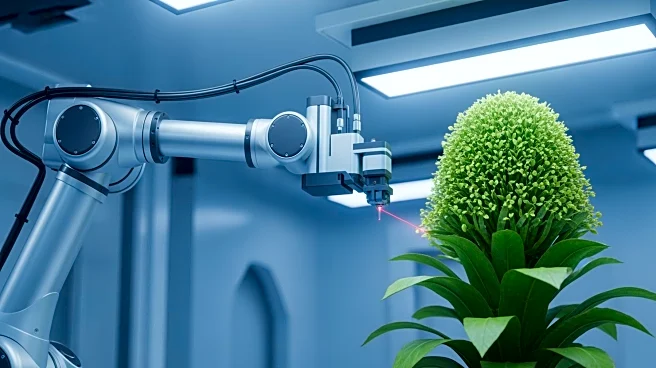What's Happening?
Carbon Robotics has developed a 'large plant model' for its laser-weeding robots, which are operational in 14 countries. The company, led by CEO Paul Mikesell, aims to address agricultural challenges by utilizing
AI and robotics to improve the weeding process, traditionally seen as costly and ineffective. Mikesell's initiative began after discussions with farmers about the difficulties in agriculture, leading to the creation of robots that can quickly provide value. The company has focused on gathering high-quality data from real-world conditions to train its AI systems effectively. This data collection involved developing a sophisticated lighting system to ensure clear images in varied outdoor conditions. The large plant model allows the AI to generalize plant types without prior knowledge, enabling the robots to adapt to new crops without retraining.
Why It's Important?
The development of the large plant model by Carbon Robotics represents a significant advancement in agricultural technology, potentially transforming farming practices. By automating the weeding process, these robots can reduce labor costs and increase efficiency, addressing a major pain point for farmers. The ability to adapt to different crops without retraining the AI model enhances the robots' versatility, making them more appealing to a broader range of agricultural operations. This innovation could lead to increased adoption of robotic solutions in agriculture, driving technological integration in the industry and potentially boosting productivity and sustainability.
What's Next?
Carbon Robotics plans to expand its product offerings, as indicated by its recent $20 million Series D-2 funding round led by Giant Ventures. The company is developing a new product line that will utilize its existing AI stack in novel ways, although specific details have not been disclosed. This expansion could further enhance the capabilities of its robotic systems, offering more comprehensive solutions to farmers. Additionally, the company is exploring the use of generative AI for synthetic training data and human interaction, which could further refine its technology and improve user experience.
Beyond the Headlines
The integration of AI and robotics in agriculture by Carbon Robotics could have broader implications for the industry, including ethical considerations regarding labor displacement and the environmental impact of increased automation. The company's focus on high-quality data collection and AI development highlights the importance of precision and accuracy in technological advancements. As these robots become more prevalent, there may be cultural shifts in farming communities, with technology playing a more central role in daily operations. Long-term, this could lead to a redefinition of agricultural practices and the skills required for modern farming.










